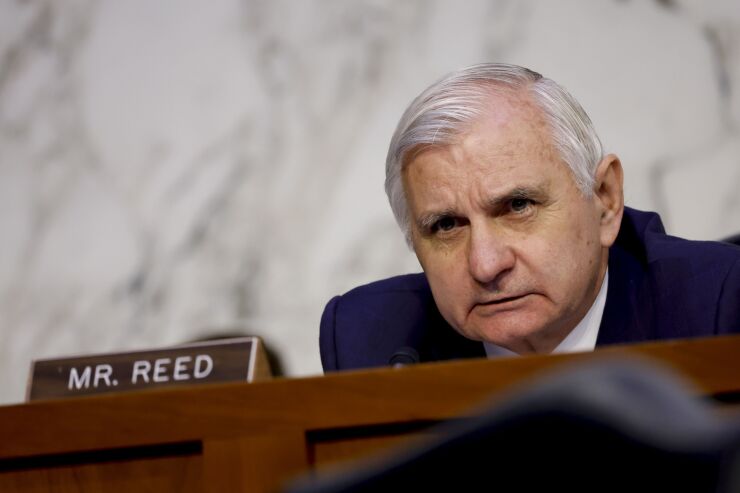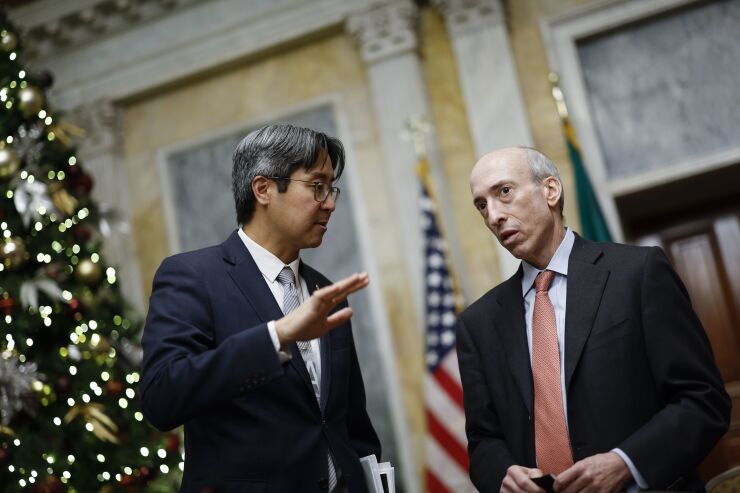
WASHINGTON — A bipartisan group of senators, led by Jack Reed, D-R.I., has introduced legislation that would toughen regulation of the crypto space.
Entitled the Crypto-Asset National Security Enhancement and Enforcement, or "CANSEE," Act, the bill would impose banklike anti-money laundering compliance obligations on decentralized finance platforms. The legislation's proponents say the bill aims to enhance oversight and guard against rampant money laundering and sanctions evasion in the largely unregulated crypto space, particularly by holding defi investors with controlling stakes in a platform accountable for wrongdoing.
Reed, a member of the Senate Banking Committee, led the bill's introduction along with co-sponsors Sens. Mike Rounds, R-S.D., Mitt Romney, R-Utah, and Mark Warner, D-Va.
"Defi and crypto ATMs are part of a largely unregulated technology that needs stronger oversight and guardrails to prevent rampant money laundering and sanctions evasion," Reed said in a
Defi protocols are financial applications operating on blockchain technology, predominantly on permissionless blockchains not controlled by a central intermediary. They're often utilized for trading cryptocurrencies anonymously and across borders. The bill defines them as any defi software — like smart contracts — that provide a mechanism for users to interact and agree to the terms of a trade for digital assets. Smart contracts are an allegedly tamper-proof kind of computer program that authorizes many defi activities. Unlike centralized protocols such as private ledgers at traditional banks or even private blockchains, permissionless blockchains allow anyone with a crypto wallet to send payments without identifying themselves.

The bill would increase government oversight of defi by subjecting the effective owners of the decentralized protocol — those with a certain level of controlling interest — responsible for compliance, based on the amount of "governance tokens" a person holds, as defined by the Securities and Exchange Commission. Defi platforms often deploy these tokens as a way of quantifying users' voting power within the protocol. The CANSEE Act would amend the Bank Secrecy Act to make "digital-asset protocol backers" and "digital-asset transaction facilitators" subject to anti-money laundering compliance requirements. The bill defines a digital-asset protocol backer as any individual holding governance tokens valued at over $25 million, and transaction facilitators as anyone who runs a digital-asset trading application or otherwise controls a digital-asset protocol as determined by the Treasury.
The bill would also require defi digital-asset protocol backers to submit annual certifications regarding the value of held governance tokens to the SEC and the Treasury, and it notes the SEC may outline procedures for calculating token values.
The bill also would make U.S. individuals who get classified as digital-asset transaction facilitators and digital-asset protocol backers subject to the legal ramifications for violating sanctions issued by the Treasury. It would crack down on crypto kiosks and would compel virtual currency kiosk operators to verify and record the identities of consumers who make virtual currency transfers. Moreover, the bill would direct the Financial Crimes Enforcement Network to set up a new reporting system where crypto kiosk operators provide a running list of their kiosk locations to Fincen.
The CANSEE Act gets at one of crypto-skeptical policymakers' main concerns in regulating the crypto industry: the fact that it is nearly impossible to hold bad actors accountable for money laundering within decentralized ledgers if there is no process for identifying a protocol's controlling entity.
Regulators have
While recent legal battles and draft regulatory bills promise to provide some crypto companies an eventual path to regulatory compliance, Wednesday's bipartisan bill suggests anonymous platforms are a non-starter for many in the beltway. There is a growing consensus in Washington around the idea that defi and AML compliance may not be compatible, something the acting chief of the Office of the Comptroller of the Currency, Michael J. Hsu, said in remarks in June.
Defi operating beyond government purview may soon face a reckoning.





